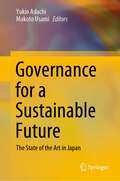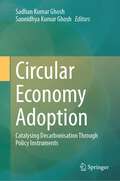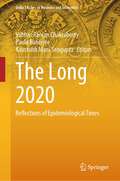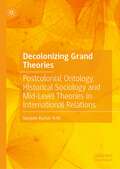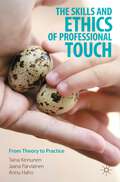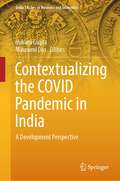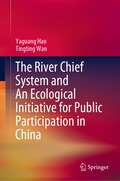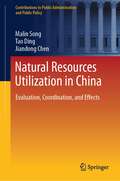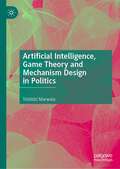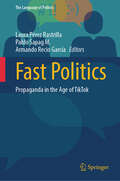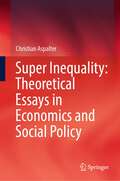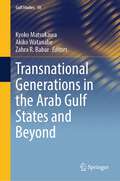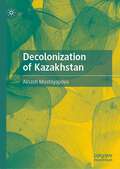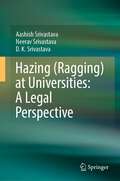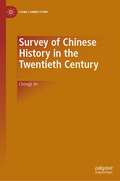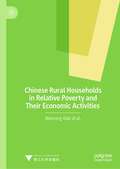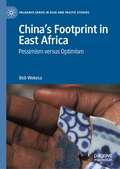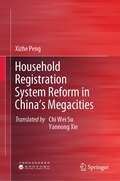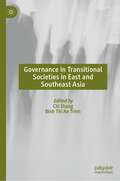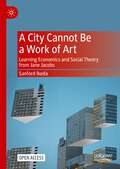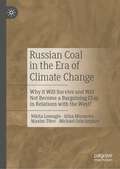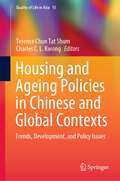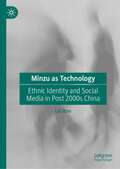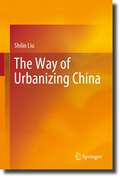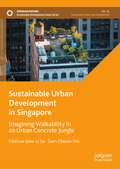- Table View
- List View
Governance for a Sustainable Future: The State of the Art in Japan
by Yukio Adachi Makoto UsamiAlthough the expression “responsibility to future generations” is firmly established in public and political vocabulary, its operational meaning and practice are inadequately understood and yet to be systematically evaluated. Moreover, the term has not been successfully translated into viable ethical and theoretical concepts that can guide public policies and actions. How can the modes of governance and established policy priorities become compatible with the well-being of future generations? The primary objective of this book is to identify the conditions of and obstacles to governance for a sustainable future, or future-regarding governance. Governance concerns steering a society over extended periods of time, not responding to particular policy issues. The ideas and strategies proposed by contributors in this book to establish future-regarding governance are based on the theoretical and empirical analyses of the major long-term problems facing advanced democracies in general, and Japan in particular. Japan is an interesting case indeed. Relatively poor climate policy, rapidly decreasing birth rate, aging population, extensive public debt, prolonged economic recession, healthcare and pension systems that urgently require redesigning, hollowing-out of industries and subsequent loss of jobs, deteriorating infrastructures, increasing nuclear waste, and intensifying social polarization have caused a decline in people’s trust in the government and democratic processes. Currently, Japanese citizens are widely circulating their doubts about the social system’s sustainability. This book comprises two parts. In Part I, authors from various disciplinary backgrounds examine the idea of governance for a sustainable future from theoretical perspectives. This part discusses issues associated with future-regarding governance that are wicked in nature, such as the philosophical/ethical foundation on which to base the idea of governance for a sustainable future, major impediments to the development of future-regarding governance, and the modes of thinking and action required by leaders and citizens to realize such governance. Chapters in Part II largely focus on the state of long-term governance in Japan. This part uses empirical and in-depth analyses with cross-sectoral and cross-national policy perspectives to identify the state of future-regarding governance in various policy fields and major sectors or organizations mainly in Japan, while also examining strategies and measures to improve their performance. From this perspective, Western democracies and weak democratic regimes elsewhere will be provided with valuable lessons to avoid fatal policy mistakes, thereby improving future-oriented governance worldwide. By combining theoretical discussions on far-reaching issues and empirical analyses of Japanese cases, the book will shed a new light on governance for a sustainable future.
Circular Economy Adoption: Catalysing Decarbonisation Through Policy Instruments
by Sadhan Kumar Ghosh Sannidhya Kumar GhoshThis edited book brings out a comprehensive collection of information on principle and policy of circular economy. It deals with the general principles, pathways of circular economic development in different countries, use of circular economy in achieving sustainable development goals. The book covers policy instruments that helps implementing resource efficient processes, strategies of implementing circular economy concepts, Decarbonisation, and developing business promoting circular economy principles. The circular economy has gained increasing prominence as a tool which presents solutions to some of the world’s most pressing sustainable development challenges. By addressing root causes, the concept of a circular economy, an economy in which waste and pollution do not exist by design, products and materials are kept in use, and natural systems are regenerated provides promise to achieving SDGs. This book is of interest and use to practitioners, capacity builders and policymakers, entrepreneurs, NGOs, general people, and valuable source of reference to the relevant researchers and students in global markets. As circular economy is gaining momentum and interest in general, the book serves as reading material for undergraduate and graduate students in any field specifically environmental science, waste management, medical science as well as environmental management at national and international level.
The Long 2020: Reflections of Epidemiological Times (India Studies in Business and Economics)
by Subhas Ranjan Chakraborty Paula Banerjee Kaustubh Mani SenguptaThis book looks at the current crises of life and livelihood following the global epidemiological crisis and various strategies to manage them as a long unfolding of past trends and future possibilities of epidemiological governance, restructuring of global economy, public health, systems of protection and care and the role of state in that, and precarities of the migrants and the refugees. It brings together scholars from different fields to think of our present in the time of COVID-19 pandemic in a longer temporal frame. The essays compiled in this book investigate issues mentioned above, covering a period from the colonial past to the postcolonial present with an aim towards encouraging scholarly debates on protection, care and justice. Although the experiences of last two years have inspired some very important academic and scholarly interventions, this book compiles original research to contextualise the present in a longue duree framework and arrive at a more complex understanding of it. It is a must-have resource for researchers of developmental studies especially in the above mentioned areas, as well as policy makers, think tanks and other non-governmental organizations interested in these areas.
Decolonizing Grand Theories: Postcolonial Ontology, Historical Sociology and Mid-Level Theories in International Relations
by Sanjeev Kumar H.M.This book examines the modes by which the grand theories of International Relations can be restructured at the level of meta-theory. It emphasizes the inability of grand theories to make sense of international relations in postcolonial societies and argues to engage in such restructuring in the domain of ontology. This is done by making a historical sociological defence toward adopting mid-level theories in IR. It is a critique of the meta-theoretical foundations of Kenneth Waltz's grand theory of neorealism, by pivoting itself upon the framework of postcolonial ontology. Dwelling upon Mohammed Ayoob’s mid-level theory of subaltern realism, it argues for undertaking the task of restructuring International Relations at the level of meta-theory, largely in the sphere of ontology. It explains how the thrust of grand theories such as neorealism, on ontological singularity can be circumvented. Owing to this, International Relations can experience a meta-theoretical transformation that may manifest in the broader engagement of the discipline itself, with the very conception of ontological multiplicity.
The Skills and Ethics of Professional Touch: From Theory to Practice
by Taina Kinnunen Jaana Parviainen Annu HahoThis book introduces readers to the ethical and goal-oriented functions of touch in professional practice. Touch is both an increasingly visible topic today and a core skill in many professions, especially in health, education and social work. This book combines helpful theoretical discussions and practical information, offering a balanced and culturally-informed introduction to an issue that both students and professionals often find difficult to navigate. Chapters discuss the various functions of touch and its uses, giving readers a deeper understanding of the potential of tactile work practices. The authors offer clear legal and ethical guidance to empower learners. They discuss key issues such as harmful touch and the increasing digitisation of patient work. Activities, case studies and further readings promote learning and help readers reflect on their own relationship to touch. This book will be an invaluable resource for students in undergraduate and graduate courses in healthcare, nursing, education and social work, and to practitioners looking for guidance on this topic.
Contextualizing the COVID Pandemic in India: A Development Perspective (India Studies in Business and Economics)
by Indrani Gupta Mausumi DasThis book brings together contributions that explore various dimensions of the pandemic from a long-term development perspective. It also analyzes the existing policy responses and the gaps therein, to enable a greater understanding of how public policy – during a pandemic like COVID-19 – can be better aligned with the developmental challenges faced by individuals and households in India. Through its thirteen contributions, the book highlights the connection between the pandemic and development as deep and multilayered, and not unidirectional. It highlights how the existing inequalities and inequities in the system determined who gets impacted and to what extent, and how soon they can recover, if at all. It analyzes policies and programmes that have been implemented based mostly on the immediate pandemic crisis, and responded less to the pre-existing conditions that have shaped socio-economic outcomes. The book would be a great resource to study possible future responses to similar health disasters in a multi-cultural, multi-religion, multi-caste and multi-class melting pot like India.
The River Chief System and An Ecological Initiative for Public Participation in China
by Yaguang Hao Tingting WanThis book provides an alternative agenda to deepening the understanding of the River Chief System as a distinctive responsibility approach to solve water pollution and associated governance dilemmas. Insightful analysis is performed through in-depth studies of the origins of China’s River Chief System, responsibility mechanisms, governmental and civil river chiefs, formal and informal water governing institutions, public participation, empowerment with accountability, and the environmental impact.
Natural Resources Utilization in China: Evaluation, Coordination, and Effects (Contributions to Public Administration and Public Policy)
by Malin Song Tao Ding Jiandong ChenThis book focuses on the evaluation, coordination, and effects of China’s natural resource utilization. By adopting both quantitative and qualitative analyses, this book objectively evaluates the spatial distribution characteristics and coupling relationship of China’s natural resource utilization based on the status quo and prominent problems during resource utilization. Moreover, the environmental, economic, and price fluctuation effects of China’s natural resource utilization are discussed. Finally, current policy systems for efficient utilization of natural resources in China and abroad are provided, which suggest a way for China to achieve efficient utilization of natural resources through an appropriate policy mechanism. This book aims to seek the balance the utilization of natural resources and sustainable development in China. It puts forward a new paradigm of natural resource utilization by incorporating the efficiency evaluation, coordination measures, and effect mechanisms of different kinds of natural resources. The evaluation system and related research methods for the efficient utilization of natural resources are very mature, laying a foundation for the development of this book’s content. As the conservation of natural resources is widely accepted, this book helps readers understand how to achieve efficient natural resource utilization in China. Meanwhile, the study of resource utilization in China can provide insights for other countries.
Artificial Intelligence, Game Theory and Mechanism Design in Politics
by Tshilidzi MarwalaThis book explores how AI and mechanism design can provide a new framework for international politics. The international political system is all manners in which countries, governments and people relate. Mechanism design in international politics relates to identifying rules that define relationships between people and countries that achieve a particular outcome, e.g., peace or more trade or democracy or economic development. Artificial intelligence is technique of making machines intelligent. This book explores mechanism design and artificial intelligence in international politics and applies these technologies to politics, economy and society. This book will be of interest to scholars of international relations, politics, sustainable development, and artificial intelligence.
Fast Politics: Propaganda in the Age of TikTok (The Language of Politics)
by Laura Pérez Rastrilla Pablo Sapag M. Armando Recio GarcíaThe goal of this book is to show the role of TikTok as a tool for political purposes. To this end, the authors analyse the messages posted on this social medium by political figures and institutions such as politicians and political parties, their impact on political landscapes, as well as the transformation of political communication techniques in order to suit the platform’s features. In the last two years, the exponential growth of TikTok has led an increasing number of politicians and institutions to incorporate it into their communication strategies. The platform displays some very different features from other social media that determine the way in which the content is presented. In addition, it manages to reach an audience that normally does not access or share political messages.Within this context, the volume pursues two main objectives. First, to examine how the communication techniques and the peculiarities of this social medium – where short videos with actors in informal attitudes prevail – affect the political message. A second objective is to analyse the influence of the messages distributed through TikTok that redefine political scenarios, and of the relationships of politicians and parties with voters. The core of the book comprises case studies that are organised into three parts, with nine chapters in all.The authors are scholars and practitioners of political communication, with diverse geographical representation, who approach the topics from a range of methodological perspectives. The first part addresses the state of the art and the influence of TikTok features on the way political communication is performed. The second part discusses the influence of TikTok on electoral scenarios and political culture in India, Bangladesh, the United States, and Ecuador. Finally, in the third part, TikTok is analysed as an instrument for promoting far right politicians and parties in Europe, as in the case of Matteo Salvini in Italy, and AfD in Germany and Vox in Spain.The volume is oriented to both scholars and communication professionals, such as journalists, communication consultants, and speechwriters, who want to become familiar with the platform, learn about its political impact, or wish to deepen their understanding of transformations in communication techniques and their adaptation to this growing social medium.
Super Inequality: Theoretical Essays in Economics and Social Policy
by Christian AspalterThis book bridges the disciplines of micro-economics and social policy in general, and, in particular, behavioral/explanatory social policy and public choice theory, plus Leibenstein’s X-efficiency theory. Being trained as an economist and social policy scientist, the author leaps out of the comfort zone of most social policy scientists and experts, right into the exciting world of micro-economic theory, and then extending and connecting those theories to explain major social, political and economic conundrums of our time. In doing so, the book offers a new set of theoretical—and practical—explanations derived from the general proposition of micro-economic theory, of how government officers, policymakers, administrators and the people themselves alike are, by and large, motivated in their daily as well as strategic (long-term) decision-making. Using a meta-analytical approach (based on a number of grand theories), this book also explains systemic factors behind human behavior and the thereof resulting shortcomings in lifetime outcomes (health, wealth and happiness of a person) and at the same time societal, policy-making, and economic outcomes on societal level, and in global comparison.The outcomes thereof can be measured exactly (and hence validated), especially through the method of empirical comparative social science/economic research. Here, the author also (but not only) introduces the new method of using Aspalter's Standardized Relative Performance (SRP) Index in measuring exactly complex, aggregate performances of multiple governments, and that at the same time also across the entire world.
Transnational Generations in the Arab Gulf States and Beyond (Gulf Studies #10)
by Kyoko Matsukawa Akiko Watanabe Zahra R. BabarThis book examines the recent migration phenomenon in the Arab Gulf states for work and residence. It sheds light on the transnationality of diverse groups of migrants from different generations, and unpacks how migrants’ multiple senses of belonging, orientations and adaptive strategies have shaped contemporary migration in the Gulf region. In turn, the analysis presented here shows how the Arab Gulf states’ citizenship and educational policies affect second-generation migrants in particular. Through a series of fine-grained ethnographic case studies, the authors demonstrate the ways in which these second-generation migrants construct their identities in relation to their putative ‘home’ country in the Gulf as well as their complex relationship to their parents’ countries of origin. This is what underpins the deeply transnational character of their lives, choices and notions of belonging. While migration scholars often situate these groups as ‘temporary’, this does not in fact capture the reality of temporariness for the migrants themselves, their children or their dependants. The result is a complex and ongoing construction of identity that shapes the way of life for millions of migrants. Relevant to scholars of migration and international studies, particularly focused on the Middle East, Transnational Generations in the Arab Gulf States and Beyond is also of interest to social scientists researching student mobility in higher education, intergenerational families, identity politics and globalisation.
Decolonization of Kazakhstan
by Ainash MustoyapovaThis book is devoted to the problem of the decolonization of Kazakhstan, which is considered in the framework of postcolonial studies. The author raises issues of identity, historical and socio-cultural heritage of nomads. In addition, the book examines and destroys colonial and Soviet myths and stereotypes concerning the history, lifestyle and traditions of the Kazakhs. Considering that imperial sentiments are increasing in Russia (as a former metropolis), the process of decolonization seems to be urgently necessary for Kazakhstan. And this process is beginning to develop actively. This fascinating polemic will interest historians, scholars trying to understand the former Soviet space, and scholars of Eurasia.
Hazing (Ragging) at Universities: A Legal Perspective
by Aashish Srivastava Neerav Srivastava D.K. SrivastavaThis is the first socio-legal multi-jurisdictional study on hazing (ragging). This book considers four countries: the USA, India, Sri Lanka, and Australia. It states the legal position, identifies lacunas in law, and proposes possible legal solutions. Unfortunately, laws, regulations, and policies have failed to stamp out hazing from university campuses and residential colleges. Hazing has spiralled out of control in a number of countries. It has descended into a cruel, barbaric, and inhuman practice. The number of students subjected to hazing and sexual abuse is alarming. According to a 2022 survey, more than half (53%) of American students who were part of a fraternity or sorority experienced hazing. Students are murdered, harmed, abused, and suffer long-term trauma. The prevention of hazing is one of the most important responsibilities of 21st century universities. The theme of the book is that universities are in the best position to protect students from hazing and must play a vital role. As a sociological study, the book also considers why hazing occurs and what can be done to prevent it. Without engaging with the underlying causes, legal punitive measures continue to address the symptom rather than the cause. The book, therefore, explores how a more innovative approach to regulation can help tackle the cause. The book will be of interest to policy makers, regulators at universities, education and legal academics, and personal injury lawyers.
Survey of Chinese History in the Twentieth Century (China Connections)
by Chongji JinThis book presents a panoramic history of the Chinese nation spanning the twentieth century, with the great rejuvenation of the Chinese nation as its central theme. In their unwavering pursuit of national independence, universal emancipation, and a country of power and shared prosperity, the Chinese people undertook an arduous journey that saw China fundamentally transformed by such historic events and experiences as the overthrow of the imperial system in the 1911 Revolution, the founding of the People’s Republic of China, reform and opening up, and the construction of socialism with Chinese characteristics. Massive in scope, meticulously documented, and rigorously written, this volume has few rivals among general histories of China in the twentieth century.
Chinese Rural Households in Relative Poverty and Their Economic Activities
by Wenrong QianThis book summarizes the new economic phenomenon and problems of rural families in China from the perspective of relative poverty. Based on the data of China Rural Household Panel Survey (CRHPS), a nationwide on-site survey conducted door to door by Zhejiang University, this book focuses on the theme of relative poverty and provides a systematic analysis of the economic activities of rural households in three main aspects: agricultural production and management, land utility and transfer, and migration of rural households and citizenization of migrant workers. Besides, this book also explores focuses on the performance of relatively poor households in terms of agricultural production, land transfer, non-farm employment and social security, and provides a basic mapping of the situation of relatively poor households in rural China, so as to provide a scientific basis for improving the living standards of rural households, establishing a long-term mechanism for poverty alleviation. CRHPS not only includes individual-level and household-level data, but also corresponding community-level data, which makes it possible to conduct a comprehensive study of the rural households. Researchers of Chinese rural problems and government officials (especially the department of agriculture officials) will find this book especially interesting.
China’s Footprint in East Africa: Pessimism versus Optimism (Palgrave Series in Asia and Pacific Studies)
by Bob WekesaBased on an extensive literature review, in-depth interviews, fieldwork, and anecdotal evidence, this text examines China’s engagement with East Africa (notably Rwanda, Burundi, Kenya, Tanzania, and Uganda) and considers these relationships through the lens of history, diplomacy, education, trade, media, cultural exchanges, and infrastructure. It probes the sentiments of pessimism, optimism, and pragmatism to explore perceptions about China in East Africa Africa. China’s ancient connection to the East African coast, as well as other incidents of contact in the past, are analyzed from the viewpoint of the deployment of Chinese soft power capital in current times.The book notably examines the significant role China is playing in the construction of new infrastructure and housing throughout East Africa and addresses China’s involvement in the natural resources sector and the political debate surrounding the construction of gas and oil pipelines, its investment in the tourism sector, in the news media and information and communication technology sectors as well as in educational and cultural programs.
Household Registration System Reform in China's Megacities
by Xizhe PengThis book examines the impact of population growth and urbanization on the household registration system in China. Drawing on experiences from other countries in population management, it proposes a general framework for reforming the household registration system in China. This framework is based on the principle of "equity of rights and obligations" and includes a points system to guide implementation. The book also analyzes the economic implications of optimizing restrictions on urban household registration and the fiscal reforms associated with the reform. The practicality of the points system program is further verified.
Governance in Transitional Societies in East and Southeast Asia
by Chi Zhang Binh Thi An TrinhThis book brings together scholars based in, or had previously been based in a range of East and Southeast Asian countries, building on their respective primary empirical data and first-hand experience as academics and think tank researchers, in order to pluralise the current debates about governance in transitional societies. In an era of global democratic backsliding, this edited volume offers less-explored local perspectives, to balance the Western-centrism observed in area studies and the focus on former Soviet countries in transit. What is the future of governance in Asia? This book, by attempting to supply a diversity of answers, will interest political scientists, economists, and journalists.
A City Cannot Be a Work of Art: Learning Economics and Social Theory From Jane Jacobs
by Sanford IkedaThis open access book connects Jane Jacobs's celebrated urban analysis to her ideas on economics and social theory. While Jacobs is a legend in the field of urbanism and famous for challenging and profoundly influencing urban planning and design, her theoretical contributions – although central to her criticisms of and proposals for public policy – are frequently overlooked even by her most enthusiastic admirers. This book argues that Jacobs’s insight that “a city cannot be a work of art” underlies both her ideas on planning and her understanding of economic development and social cooperation. It shows how the theory of the market process and Jacobs’s theory of urban processes are useful complements – an example of what economists and urbanists can learn from each other. This Jacobs-cum-market-process perspective offers new theoretical, historical, and policy analyses of cities, more realistic and coherent than standard accounts by either economists or urbanists.
Russian Coal in the Era of Climate Change: Why it Will Survive and Will Not Become a Bargaining Chip in Relations with the West?
by Nikita Lomagin Irina Mironova Maxim Titov Michael OshchepkovThe Russian coal sector today faces challenges in the form of global decarbonization, sanctions, and difficulties in retaining market access and competitiveness. This new market environment warrants an examination of what lessons can be drawn from the past tribulations of one of Russia’s most iconic and strategically important industries. This book analyzes the Russian coal industry developments in historical and political contexts, including those of energy transition. The key tenets of contemporary dialogue between Russia and those who advocate for a speedy energy transition to phase out coal are presented. The book addresses the question of the coal industry as a sacrifice for the sake of Russia’s rapprochement with the West. The contribution of this book, therefore, is filling the gap between two large research inquiries – climate change mitigation and energy transition on the one hand, and the existing large coal industry of a given country on the other.
Housing and Ageing Policies in Chinese and Global Contexts: Trends, Development, and Policy Issues (Quality of Life in Asia #15)
by Terence Chun Tat Shum Charles C. L. KwongMotivated by the rapid increase in housing demand and the population of older adults worldwide, this book provides an interdisciplinary and multi-level approach for studying housing and ageing issues and relevant policy analysis in China, and beyond. Specifically, it highlights how the changing social, economic, and political factors at both local and global levels affect the housing or ageing experiences of people. Drawing on findings and theoretical discussions in economics, history, psychology, sociology, social policy, and urban studies, the authors offer interdisciplinary perspectives on a highly topical debate, asking what progress is being made on the formulation and implementation of housing and ageing policies in different societies. The book brings together original qualitative and quantitative research works in European, Asia-Pacific and Chinese contexts. Readers will benefit from the results of a rigorous analysis of data and case studies that reveal factors affecting housing or ageing experiences of people in these regions. The interdisciplinary research also provides valuable insights on further policy analyses and formulation in both local and global contexts. It is of interest to scholars, policy makers and university students in the fields of housing, ageing, and social and public policy.
Minzu as Technology: Ethnic Identity and Social Media in Post 2000s China
by Lei HaoThis book provides a unique ethnographic approach to the understanding of ethnogenesis in the Chinese context, with a particular focus on how it is being reshaped in the post-2000s era. It reinterprets the Chinese concept of ethnicity, or minzu, by investigating its evolution in relation to the proliferation of media technologies. In an era characterized by digital connectivity, the quest for ethnic identity has taken on new dimensions. Ethnic groups, like the Sibe community from Xinjiang, are now extending beyond the state’s traditional interpretations of minzu. Leveraging the power of media technology, they are articulating and expressing their ethnic identities in new and personalised ways. These developments have led to the emergence of what this book terms ‘networked ethnicity,’ a fresh manifestation of ethnic identity formation in the era of social media. The pivotal question this book attempts to answer is: How does an ethnic group in China today understand its identity, and what role does technology and media play in that process? This exploration offers a critical perspective on the complex interplay between digital technology, individual agency, and ethnic identity formation. This study will be of interest to scholars of cultural studies, Chinese society, ethnic studies, and media studies, or anyone keen to understand the changing landscape of ethnic identity in the digital age.
The Way of Urbanizing China
by Shilin LiuThe book conducts a comprehensive research study on China’s urbanization. It puts forward three theoretical development models of urban planning in China, i.e., the politics-oriented city, the economy-oriented city and the human-oriented cultural city. It makes objective evaluations of the development models of the politics-oriented city and the economy-oriented city. It suggests that relations between the government and the market should be straightened out to solve the hangovers of the development model of the politics-oriented city, and eco-civilization development and cultural development should be put on the top of the government’s agenda in order to cope with the recurring problems and complications brought about by the development model of the economy-oriented city.
Sustainable Urban Development in Singapore: Imagining Walkability in an Urban Concrete Jungle (Sustainable Development Goals Series)
by Melissa Liow Li Sa Sam Choon-YinThis book offers theoretical and practical insights into land use, transport, and national policies in one of world’s well-known urban concrete jungle, none other than the Singapore city. The emphasis is situated on Singapore’s attempt to promote walking and cycling. Greater appreciation of walkability thrives on Singapore’s rich history, green city, people and the gastronomic kopitiam and hawker culture. The book offers a comprehensive coverage of walkability as a crucial component of urban design to reduce vehicular congestion with the associated carbon emissions, foster a healthy lifestyle and community participation and create jobs to help the economy. A high income per capita and an aging society, lessons drawn from Singapore’s experience will be useful to other societies. Scholars in sustainable tourism field, urban planners, government bodies, tourist boards, entrepreneurs, national parks board, residents, and inbound travellers will benefit from reading the book.
